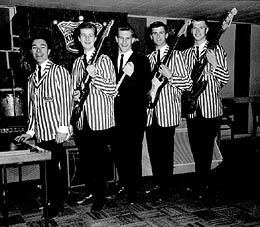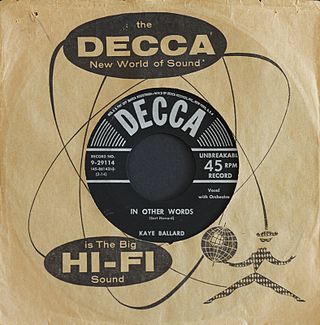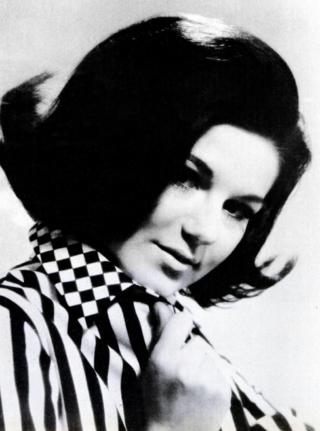Related Research Articles

"Puff, the Magic Dragon" is a song written by Peter Yarrow of Peter, Paul and Mary from a poem by Leonard Lipton. It was made popular by Peter, Paul and Mary in a 1962 recording released in January 1963.

The Kingsmen are a 1960s American rock band from Portland, Oregon. They are best known for their 1963 recording of R&B singer Richard Berry's "Louie Louie", which held the No. 2 spot on the Billboard charts for six weeks and has become an enduring classic.

"Fly Me to the Moon", originally titled "In Other Words", is a song written in 1954 by Bart Howard. The first recording of the song was made in 1954 by Kaye Ballard. Frank Sinatra's 1964 version was closely associated with the Apollo missions to the Moon.

Maria Muldaur is an American folk and blues singer who was part of the American folk music revival in the early 1960s. She recorded the 1973 hit song "Midnight at the Oasis" and has recorded albums in the folk, blues, early jazz, gospel, country, and R&B traditions.

"Fever" is a song written by Eddie Cooley and Otis Blackwell, who used the pseudonym "John Davenport". It was originally recorded by American R&B singer Little Willie John for his debut album, Fever (1956), and released as a single in April of the same year. The song topped the Billboard R&B Best Sellers in the US and peaked at number 24 on the Billboard pop chart. It was received positively by music critics and included on several lists of the best songs when it was released.
"Oh-Oh, I'm Falling in Love Again" is a popular song written by Al Hoffman, Dick Manning, George David Weiss, Hugo Peretti and Luigi Creatore and published in 1958. The best-known recording of the song was done by Jimmie Rodgers, charting in 1958. It debuted on the charts in February, and spent 11 weeks on the charts that spring, peaking at No. 13 on the U.S. Cash Box Top 100 and No. 7 on the Billboard Hot 100. It became a gold record.

"I Say a Little Prayer" is a song written by Burt Bacharach and Hal David for Dionne Warwick, originally peaking at number four on the U.S. Billboard Hot 100 pop singles chart in December 1967. On the R&B Singles chart it peaked at number eight.

Peggy March is an American pop singer. In the United States, she is primarily known for her 1963 million-selling song "I Will Follow Him". Although she is sometimes remembered as a one-hit wonder, she continued to have success in Europe well into the 1970s.

"Smoke Gets in Your Eyes" is a show tune written by American composer Jerome Kern and lyricist Otto Harbach for the 1933 musical comedy Roberta. The song was sung in the Broadway show by Tamara Drasin. Its first recorded performance was by Gertrude Niesen, who recorded the song with orchestral direction from Ray Sinatra, Frank Sinatra's second cousin, on October 13, 1933. Niesen's recording of the song was released by Victor, with the B-side, "Jealousy", featuring Isham Jones and his Orchestra. The line — When your heart's on fire, smoke gets in your eyes — apparently comes from a Russian proverb.

"The First Time Ever I Saw Your Face" is a 1957 folk song written by British political singer-songwriter Ewan MacColl for Peggy Seeger, who later became his wife. At the time, the couple were lovers, although MacColl was still married to his second wife, Jean Newlove. Seeger sang the song when the duo performed in folk clubs around Britain. During the 1960s, it was recorded by various folk singers and became a major international hit for Roberta Flack in 1972, winning Grammy Awards for Record of the Year and Song of the Year. Billboard ranked it as the number-one Hot 100 single of the year for 1972.

"I Will Follow Him" is a popular song that was first recorded in 1961 by Franck Pourcel, as an instrumental titled "Chariot". The song achieved its widest success when it was recorded by American singer Little Peggy March with English lyrics in 1963. The music was written by Franck Pourcel and Paul Mauriat. It was adapted by Arthur Altman. The completely new English lyrics were written by Norman Gimbel.
"Blue Velvet" is a popular song written and composed in 1950 by Bernie Wayne and Lee Morris. A top 20 hit for Tony Bennett in its original 1951 version, the song has since been re-recorded many times, with a 1963 version by Bobby Vinton reaching No. 1.

"Can't Get Used to Losing You" is a song written by Jerome "Doc" Pomus and Mort Shuman, first made popular by Andy Williams in a 1963 record release, which was a number-two hit in both the US and the UK. Twenty years later, British band the Beat took a reggae re-arrangement to number three in the UK.

"Rhythm of the Rain" is a song performed by The Cascades, released in November 1962 in the US and on January 25, 1963 in the UK. It was written by Cascades band member John Claude Gummoe. On March 9, 1963, it rose to number 3 on the Billboard Hot 100, and spent two weeks at number 1 on Billboard's Easy Listening chart. Billboard ranked the record as the number 4 song of 1963.

"Da Doo Ron Ron (When He Walked Me Home)" is a song written by Jeff Barry, Ellie Greenwich and Phil Spector. It first became a popular top five hit single for the American girl group the Crystals in 1963. American teen idol Shaun Cassidy recorded the song in 1977 and his version hit number one on the Billboard Hot 100 chart. There have also been many other cover versions of this song, including one by the songwriters Jeff Barry and Ellie Greenwich themselves, performing as the Raindrops.

"Roses Are Red (My Love)" is a popular song composed by Al Byron and Paul Evans. It was recorded by Bobby Vinton, backed by Robert Mersey and his Orchestra, in New York City in February 1962, and released in April 1962, and the song was his first hit.
"I'm Looking out the Window" is a ballad written by Don Raye and John Jacob Niles. Peggy Lee first recorded the song as a B-side for her 1959 single "Hallelujah, I Love Him So". The song is best known as a hit record for Cliff Richard in 1962 in numerous countries, although not in the United States.

"Atlantis" is a rock music instrumental by British group the Shadows, released as a single in May 1963. It spent 17 weeks on the UK Singles Chart, peaking at number two for two weeks.

"Little Town Flirt" is a song by Del Shannon, which was released as a single in 1962 from the album Little Town Flirt in 1963. It spent 14 weeks on the Billboard Hot 100 chart, peaking at No. 12, while reaching No. 1 on the Irish Singles Chart, No. 1 in Australia, No. 4 on the UK's Record Retailer chart, No. 7 on New Zealand's "Lever Hit Parade", and No. 9 on Canada's CHUM Hit Parade.
References
- ↑ "Peggy March 1963". Archived from the original on September 17, 2021. Retrieved September 17, 2021.
- ↑ Roberts, David (2006). British Hit Singles & Albums (19th ed.). London: Guinness World Records Limited. p. 349. ISBN 1-904994-10-5.
- ↑ "Little Peggy March". Billboard .